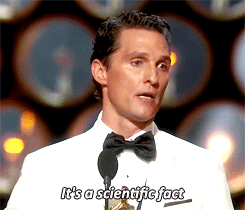Major spoilers for Interstellar follow. Go watch that fantastic movie in order to read this fantastic article! Two science birds with one science stone! You’re welcome!
I love Interstellar.
And it’s all because of Matthew McConaughey and his beautiful whistling “s” sounds.
Well. It’s because of science too. But the “s” sounds help.
Interstellar does so many things well. It’s heartfelt. It’s funny. It has TARS, cinema’s finest wise-aleck robot. Plus, in a lot of ways, it’s our generation’s 2001. But better.
That’s right, I said it. Fight me, film majors.
It also does some really clever things — things that the movie itself doesn’t draw attention to. For example: the portrayal of scientists. I know this may seem like a really little thing, but do something for me. Think of a scene from a movie involving a scientist. Wait, let me guess: their Bernie Sanders-looking ass rushes in with papers flying everywhere, hair going every which way, and says something to the tune of “Great Scott, Arnold Schwarzenegger! According to my calculations, the aliens are vulnerable to bullets!” Schwarzenegger spouts some one-liner and the scientist is never seen again.
Please, hold your applause. I’ve been watching a lot of The Mentalist lately.
There are a lot of Sanders lookalikes running around Hollywood, apparently. No, I’m sorry, I’m generalizing: there’s also the reedy white guy scientists with plans for world domination.
Can’t forget the reedy white guys.
What’s really cool about Interstellar is that pretty much everyone in the movie is a scientist (and a solid percentage are female scientists!), and they’re all really chill about it. Like, several times during the movie somebody casually explained the theory of relativity to Matthew McConaughey. Dammit, Matthew, gravity bends space and time. Get it through your thick, beautiful skull.
Plus, nobody said “According to my calculations,” which in itself is a victory.
The really cool thing about Interstellar is that it not only teaches you about science — it makes you wonder about science, which is six jillion times better. That is an approximate figure.
“But Jerry,” you might say, “I thought this was a movie about Matthew McConaughey being a great dad and also Anne Hathaway was there? At what point did this movie spark my curiosity for exotic physics?”
Well yeah, both of those great things did happen in this excellent movie. But the greater thing that happened was that this movie threw science at you in a very particular way. In a lot of sci-fi movies, there’s science happening, but the characters feel they need to explain exactly what’s happening because some of the science that’s happening is shoddy and needs to have a convoluted explanation to make sense. So what you’re left with at the end of a movie is some very well-explained fake science. What you’re left with at the end of Interstellar is some actual science that hasn’t been explained at all—aside from when Anne Hathaway said the word “relativity” a couple of times.
That’s actually a good thing, though. To understand what I mean, let’s get anecdotal:
I first saw Interstellar in George RR Martin’s dinky (read: artsy) little movie theatre in Santa Fe, New Mexico. Yes, George RR Martin lives in my old town. Yes, I saw him pretty much on the reg. Let’s try to move past this with a minimum of squealing.
Here I was sitting through this movie about a Texan lost in space and they landed on this water planet. Ok, I thought to myself. Water. I can deal with that. Then they said that the gravity of this water planet would change the time of the astronauts relative to the time of the people on Earth. Ok, I thought to myself. That’s some crazy movie science. I can handle that.
But wait, was my second thought. I read somewhere that all the physics in the movie was truthful, and the real-life physicist executive producer for the movie was a hard-ass on making sure the physics stayed truthful. His name was Kip Thorne and a lot of the physics in Interstellar was based on his research.
So when I got back home, I looked up these concepts, expecting to see that Mr. Thorne fudged the numbers a little bit. But no, Neil Degrasse Tyson himself said that the physics was legit. Huh.
It was in a very specific way that the movie introduced you to these concepts: a lot of these ideas, like time stretching, black holes and quantum physics, generally come from the “new physics.” Back in the early 1900’s, physics changed so darn much — what with Einstein and his relativity and that whole quantum physics thing — from what it was just a decade before that scientists started calling these developments the new physics. Interstellar throws us into the deep end of the new physics. Black holes, time stuff, all that, we just literally see on screen with little to no explanation. So we ask ourselves, “Really?” But the art to Interstellar is that these things are presented in such a way that makes it seem like they’re legit. And, thanks to Kip Thorne, we know they are legit. But... really?
Yup.
There’s a lot of stuff in the movie, so legit-ness lightning round:
That disk of light around the black hole?
Legit!
Huge wave-mountains?
Legit!
Wormholes?
Well, they’ve never been observed, but they’re theoretically sound so for the sake of succinctness we’ll say LEGIT!
Gravity causing time to move slower?
Very legit!
Gravity causing time to move slower to the degree shown in the movie?
Also very legit!
Fifth-dimensional beings?
Well, okay, here’s where Interstellar really shines. It makes us want to ask these questions, to know more, and when the answer to the question Really? is so often a resounding yes, it makes us even hungrier for more of our crazy science ideas to be confirmed. But when we reach the question of higher dimensions, the answer is, We don’t know.
And that gives us pause. And we think, well, what if?
This is what makes Interstellar a great movie. It’s not the weird plot, it’s not the visuals, it’s not even Mr. McConaughey.
Ahem. Sorry. What was I saying?
Right, it’s not even Matthew (sorry Matt). Interstellar is a great movie because it does what every movie based on weird science, or even sci-fi in general, should always do. It gets its facts straight, and then when it gets to the point where we don’t have any facts yet, it gets a little out there and says, “Maybe. Maybe not. But wouldn’t it be cool?”
That’s what science is about: maybe, maybe not. It’s about encouraging people to think outside of the box, because pretty much every meaningful scientific advance came because someone got a little out there and thought outside of the box. They didn’t just lose touch with reality, but based on the facts and knowledge that the human race at that point in time possessed, they took a leap and landed on something spectacular.
And that’s why Interstellar is great. It nudges us towards the spectacular.























